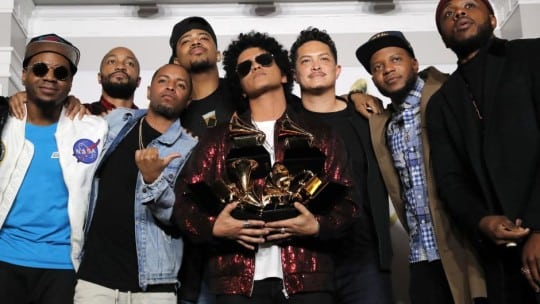
Is #MeToo a movement, or a marketing tactic?
To many, the Jan. 28 Grammy Awards fell short of the former, paying lip service to the women of #MeToo and #TimesUp without having a real impact on the music industry. Most of the night's award winners were men, with female performers like SZA—who was nominated for five awards—losing to the likes of The Weeknd and Bruno Mars.
Here are three ways the Grammy ceremony failed to authentically embrace its #MeToo moment:
Kesha's loss. Pop vocalist Kesha led one of the few planned #MeToo moments at the ceremony, a star-studded all-women rendition of her song "Praying." The song is an emotional takedown of the pop star's alleged abuser and former producer Lukasz "Dr. Luke" Gottwald. But the performance stood in stark contrast to Kesha's loss to Ed Sheeran in the Best Solo Pop Performance category. (Sheeran wasn't at the ceremony to accept his award.)
Twitter users were furious at Sheeran's win:
"Ed Sheeran" is a hell of a way to mispronounce "Kesha."
— Marc (@MarcSnetiker) January 29, 2018
White roses drooped. While performers and attendees were encouraged to wear a white rose to show support for the women of the #MeToo movement, the gesture felt more like a fashion statement than a show of solidarity. As Pitchfork journalist Quinn Moreland reported, "the white rose on the Grammy red carpet were spotty at best—despite personally witnessing some publicists carrying small bouquets of them, for keeping their artists on trend."
Too little, too late. Voices In Entertainment, the group of female label executives who made the white rose announcement, sent out a letter inviting artists to wear the symbol only days before the event. And Janelle Monae, who introduced Kesha's performance, was the first to mention the Time's Up movement—a whole two hours into the the ceremony. The timing of both the announcement and Kesha's performance made the Grammys' #MeToo moment appear like an afterthought.
The Grammys' failed to directly address the tenets of the #MeToo movement—equal pay and representation; an end to sexual misconduct in the entertainment industry. It looked and felt like hasty #MeToo me-tooism.
It's a warning to other brands hoping to do the same: Make sure your brand's actions live up to its marketing promises—or risk alienating the very audience you hoped to impress.
